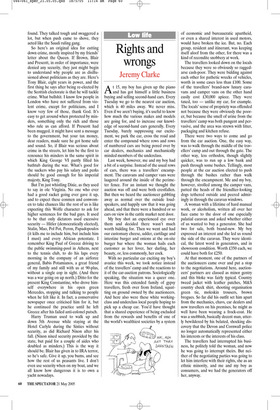Rights and wrongs
Jeremy Clarke
At 15, my boy has given up the piano and has got himself a little business buying and selling second-hand cars. Every Tuesday we go to the nearest car auction, which is 40 miles away. We never miss. Even if we aren’t buying, it’s useful to know how much the various makes and models are going for, and to increase our knowledge of second-hand cars generally. Every Tuesday, barely suppressing our excitement, we park the car, cross the road and enter the compound where rows and rows of numbered cars are being pored over by car dealers, mechanics and mechanically minded members of the underclass.
Last week, however, me and my boy had a bit of a surprise. Instead of the usual rows of cars, there was a travellers’ encampment. The caravans and camper vans were laagered around the inside of the perimeter fence. For an instant we thought the auction was off and were both crestfallen. But then we heard the auctioneer gabbling away as normal over the outside loudspeakers, and happily saw that it was going ahead, and that there were a hundred or so cars on view in the cattle market next door.
My boy shot an experienced eye over them and decided there wasn’t much worth bidding for. Then we went and had our customary cheese, udder, cartilage and intestine burger and onions at the on-site burger bar where the woman hails each customer as her lover, her darling, her beauty, or, less commonly, her cock.
With no particular car exciting my boy’s avarice this week, we took notice instead of the travellers’ camp and the reactions to it of the car-auction patrons. Sociologically speaking, the situation was a queer one. Here was this extended family of gypsy travellers, fresh over from Ireland, squatting on ground owned by the auctioneers. And here also were these white workingclass and underclass local people hoping to pick up a cheap car. You’d have thought that a shared experience of being excluded from the rewards and benefits of one of the world’s wealthiest societies by a system of economic and bureaucratic apartheid, or even a shared interest in used motors, would have broken the ice. But, no. Each group, resident and itinerant, was keeping itself aloof from the other, for there was a kind of recondite snobbery at work.
The travellers looked down on the locals because they were so obviously so raggedarse cash-poor. They were bidding against each other for pathetic wrecks of vehicles, worth in some cases less than £100. Some of the travellers’ brand-new luxury caravans and camper vans on the other hand easily cost £30,000 apiece. They were taxed, too — unlike my car, for example. The locals’ sense of propriety was offended not because they were obviously the poorer, but because the smell of urine from the travellers’ camp was both pungent and pervasive, and the area was strewn with litter, packaging and kitchen refuse.
There were two ways to come and go from the car auction. One, the easy way, was to walk through the middle of the travellers’ camp and out through the gate. The other way, less orthodox, though slightly quicker, was to run up a low bank and push through some bushes. Tellingly, most people at the car auction elected to push through the bushes rather than walk through the encampment. Me and my boy, however, strolled among the camper vans, patted the heads of the friendlier-looking dogs tethered outside and peered admiringly in through the caravan windows.
A woman with a lifetime of hard manual work, or alcoholism, written all over her face came to the door of one especially palatial caravan and asked whether either of us wanted to buy a generator. She had two for sale, both brand-new. My boy expressed an interest and she led us round the side of the caravan. They were identical, the latest word in generators, and in showroom condition. Worth £350 each, we could have both for £250.
At that moment, one of the partners of the auctioneers came over and put a stop to the negotiations. Around here, auctioneers’ partners are classed as minor gentry and this bloke was fairly typical. Country tweed jacket with leather patches, M&S country check shirt, shooting organisation green tie, moleskin trousers, brown brogues. So far did his outfit set him apart from the mechanics, chavs, car dealers and now travellers on his premises, he might as well have been wearing a frock-coat. He was a snobbish, basically decent man, utterly bewildered by his belated, shocking discovery that the Devon and Cornwall police no longer automatically represented either his interests or the interests of his class.
The travellers had interrupted his business, he politely told the woman, and now he was going to interrupt theirs. But neither of the negotiating parties was going to let him interfere with their rights, she as an ethnic minority, and me and my boy as consumers, and we had the generators off her, anyway.

























































 Previous page
Previous page